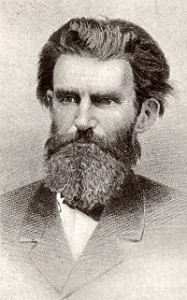Sweet hour of prayer, sweet hour of prayer,
That calls me from a world of care,
And bids me at my Father’s throne
Make all my wants and wishes known;
In seasons of distress and grief
My soul has often found relief,
And oft escaped the tempter’s snare
By thy return, sweet hour of prayer.
Sweet hour of prayer, sweet hour of prayer,
Thy wings shall my petition bear
To Him whose truth and faithfulness
Engage the waiting soul to bless;
And since He bids me seek His face,
Believe His Word, and trust His grace,
I’ll cast on Him my every care
And wait for thee, sweet hour of prayer.
Sweet hour of prayer, sweet hour of prayer,
May I thy consolation share,
Till from Mount Pisgah’s lofty height
I view my Home, and at the sight,
Put off this robe of flesh, and rise
To gain the everlasting prize,
And realise forever there
The fruits of the sweet hour of prayer.
Such a beautiful, meditative hymn, yet such controversy regarding its authorship! It first appeared in The New York Observer in September, 1845, with an explanatory note about one possible author. The note was by a British minister, Rev. Thomas Salmon, who had recently immigrated to the United States. Salmon claimed to have met, in Coleshill, England, a blind preacher named W.W.Walford. Rev. Salmon went on to extol the preaching ability of this uneducated man, who had committed much of the Bible to memory! On one of Salmon’s visits to Walford, the blind man recited a poem he had composed, and had Rev. Salmon write it down for him, just as Fanny Crosby did with her songs. Thomas Salmon said he quickly wrote down the lines and soon submitted them to The New York Observer.
Such a beautiful, meditative hymn, yet such controversy... Share on X
Mysteriously, no trace has ever been found of the W.W. Walford described! Instead, a minister named William Walford, who lived about 100 miles away in Homerton, England, is known to have written a book about prayer, with very similar thoughts to this poem. This man was neither blind nor uneducated! He is thought likely to have been the author, but the questions still linger. Was there any truth to Rev. Salmon’s story? If not, why did he concoct it? Perhaps a newspaper writer created the interesting background! Whatever the truth is, neither Walford nor Salmon ever knew the extent of the ministry of the poem, because the tune was written by William Bradbury several years after the death of Salmon, and then began to appear in various hymnals.
Mysteriously, no trace has ever been found of the W.W. Walford described! Share on XWORDS: ATTR. TO WM. WALFORD MUSIC: WM. BRADBURY
S.A. SONG BOOK, 1987 EDITION, # 633; 2015 EDITION, # 787
REFERENCE: MORGAN, ROBERT J., THEN SINGS MY SOUL, BOOK 2
Enjoy these two versions.







